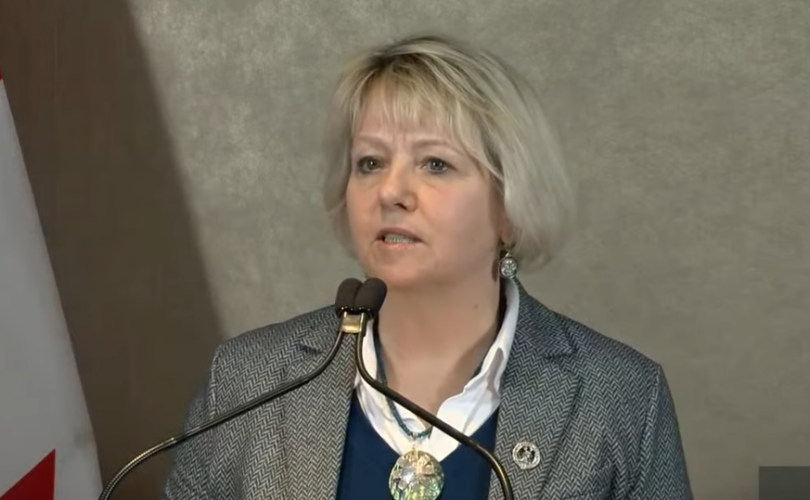
ER Editor: BC, or Lotusland (old nickname for British Columbia on Canada’s west coast), is full-on Globalistan. And here’s what’s happening, which you couldn’t make up. All the cities included in this report (including Portland, Oregon), with stories of decline and human destruction, are members of the C40, global cities club.
We’ve previously reported on BC and Vancouver in this regard. See —
British Columbia Becomes First Province in Canada to Allow Carry of Heroin, Fentanyl, Cocaine, Other Hard Drugs

Are They Making Cocaine Legal in British Columbia?
And for more madness of a different sort, also from BC earlier this month —
British Columbia passes bill allowing 12-year-olds to legally ‘self-identify’ as opposite sex

***
Here’s a 3-day old story from BC about the extent to which drugs are a problem in the area. See —
Vancouver police seize nearly $8 million in fentanyl, cocaine from lab in Richmond home
But – but – but … the government is permitting this, sort of!
*******
British Columbia breaks new overdose records one month after decriminalizing all drugs
Overdoses continue to skyrocket in B.C. seven years after the province declared the drug epidemic a public health emergency.
JACK BINGHAM for LIFESITE NEWS
 Dr. Bonnie Henry announcing the decriminalization of drugs in B.C.Global News / YouTube
Dr. Bonnie Henry announcing the decriminalization of drugs in B.C.Global News / YouTube(LifeSiteNews) — Seven years after the province of British Columbia declared the drug epidemic a public health emergency, and just one month after the decriminalization of all drugs, overdoses continue to skyrocket.
According to the Canadian Press, B.C. tragically set three new overdose records this March, just the second month after Prime Minister Justin Trudeau’s federal government allowed the province to decriminalize all drugs starting February 1, 2023, in an effort to combat the crisis.
In March, B.C. saw the most overdose calls ever recorded in one day (205), the highest 30-day overdose call average (119.9), and the most days in a row where paramedics were called to 100 or more such calls (19).
Declaring the uptick in overdoses a public health emergency on April 14, 2016, recent statistics show that annual deaths have nearly quintupled since the government began ramping up its intervention.
The 2016 emergency was invoked after statistics showed that 474 British Columbians had died from drug overdoses in 2015. In 2022, that number had increased nearly 5-fold, resting at just under 2,300 lives lost.
While the current approach by B.C. and many other liberal governments is to increase the so-called “safe supply” of drugs, to erect “supervised consumption sites” where those addicted can legally use drugs in the presence of medical personnel, or to outright decriminalize the possession of drugs, statistics indicate that this strategy has led to the problem getting worse, not better.
For example, the American state of Oregon — separated from B.C. by Washington state — decriminalized all drugs in late 2020.
In 2021, the first full year the policy was in effect, Oregon saw a whopping 52 percent increase in opioid-related deaths, jumping from 472 before decriminalization to 745 after decriminalization.
Similar trends have been observed in other jurisdictions that have opted for a soft-on-crime approach to drugs by law enforcement, including San Francisco, Los Angeles, and Seattle.
Beyond just statistics, experts and former addicts have also weighed in on the issue, often expressing their displeasure with the current trend being set by government.
Speaking about the danger of drug decriminalization, attorney Heather MacDonald of the Manhattan Institute for Policy Research previously told the Epoch Times that “virtually no one is in prison for a possession of a user’s amount of drugs,” but because drugs are illegal, being able to detain and question those in possession of small amounts allows law enforcement access to high-level drug dealers. The criminalization of drugs, she explained, is actually a very “valuable tool … to protect the public from clear harm.”
In San Francisco, one former drug addict and dealer, Ricci Wynne, has taken to documenting the state of the city on social media in an effort to show, in his opinion, why decriminalization, “safe consumption” sites, and the entire “harm reduction” model of treating addiction is only making matters worse.
Speaking about these types of policies, Wynne told Fox News host Jesse Watters that since these practices have gone into effect, “people are coming here to San Francisco in droves, for what I like to call ‘druggie tourism.’”
“They come here because they know the consequences are minuscule, if any, and they can come here and just use openly,” he explained.
Wynne then stated that “when all the drug addicts come here, what follows is all the drug dealers,” which he sees as a reason other forms of crime are also on the rise in San Francisco and other similar cities.
“Me, myself, personally, coming from that lifestyle … seeing [San Francisco] in such a disarray like this is quite shocking because they are just doing this stuff in the open right now,” he lamented.
************
Source
Featured image, Dr. Bonnie Henry: Flickr:bcgovphotos
Featured image, Justin Trudeau: Patrick Doyle/Reuters

••••
The Liberty Beacon Project is now expanding at a near exponential rate, and for this we are grateful and excited! But we must also be practical. For 7 years we have not asked for any donations, and have built this project with our own funds as we grew. We are now experiencing ever increasing growing pains due to the large number of websites and projects we represent. So we have just installed donation buttons on our websites and ask that you consider this when you visit them. Nothing is too small. We thank you for all your support and your considerations … (TLB)
••••
Comment Policy: As a privately owned web site, we reserve the right to remove comments that contain spam, advertising, vulgarity, threats of violence, racism, or personal/abusive attacks on other users. This also applies to trolling, the use of more than one alias, or just intentional mischief. Enforcement of this policy is at the discretion of this websites administrators. Repeat offenders may be blocked or permanently banned without prior warning.
••••
Disclaimer: TLB websites contain copyrighted material the use of which has not always been specifically authorized by the copyright owner. We are making such material available to our readers under the provisions of “fair use” in an effort to advance a better understanding of political, health, economic and social issues. The material on this site is distributed without profit to those who have expressed a prior interest in receiving it for research and educational purposes. If you wish to use copyrighted material for purposes other than “fair use” you must request permission from the copyright owner.
••••
Disclaimer: The information and opinions shared are for informational purposes only including, but not limited to, text, graphics, images and other material are not intended as medical advice or instruction. Nothing mentioned is intended to be a substitute for professional medical advice, diagnosis or treatment.





Leave a Reply